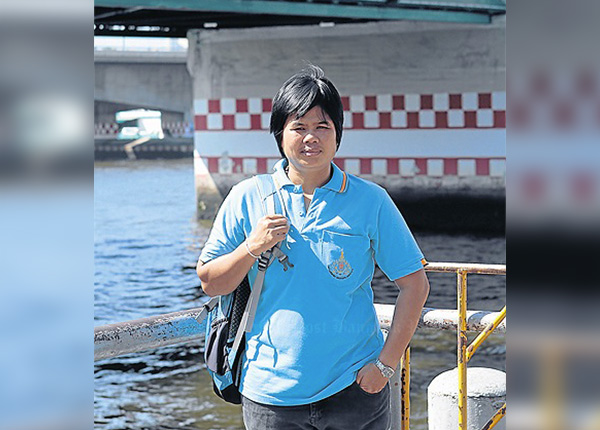22 พฤษภาคม 2556

The first thing that greets an outsider who steps into the small patch of garden under Saphan Phut (Memorial Bridge) is a strong stench of urine. Male underwear is strewn carelessly on the ground, while a toddler plays by himself - not in a crib, but in a battered foam box. There is no roof. There is no toilet. There is no furniture except for a few floor mats.
This is what 60 lives call home, and it is the only home they know.
Narisaraporn Asipong, known affectionately by her students as Khru Nang, has spent the majority of her time with these "homeless kids" for 12 years. With a determination to make a difference to society, she left her home in Si Sa Ket and travelled to Bangkok to join the Mercy Center, working as a volunteer teacher for street children around Saphan Phut.
"I still remember the first day I came here. I only had a backpack with me, and no idea what I was going to see," said Narisaraporn, who was recently named an Honorary Miss Labour 2013 in recognition of her selfless dedication to those who have no family and no home.
One lesson she learned was that it would take a lot of time to make them open up to her.
"They have a very strong defence mechanism because they have been brutally disappointed, rejected and abused by their own family. It wasn't easy to convince them that I am here to help," said Narisaraporn, adding that for some students, it took two years just to get to know them.
Her "students" come in different ages, from two to 70 years old. What they all have in common is a broken family that either did not want them or did not care whether they stayed or left.
"Nobody would be here by choice. If it were up to them, they would all be in a nice home with a loving family. But in reality, they have nowhere else to be.
"It is tremendously heartbreaking when I take someone home to see his or her parent, and we both get the door slammed in our faces. One time, the mother even told me not to ever contact her again unless the kid ends up in jail or in a coffin," recalled Narisaraporn.
She explained that the main reason for these children leaving their homes was a broken family or an abusive one, so her job is to be there for them as someone who is reliable and will never leave them behind.
"They do miss their family, but having been discarded like garbage, or having seen other friends going through something so bitter, they call it fate and call this place home," she said.
"Imagine how their home lives must have been, for them to prefer living on the street like this."
Their lives are painfully simple. They sleep on the ground with nothing more than a mat or cardboard. They take a shower once a week, and some never wash their clothes because they have nothing to change into. When the rain comes down, they run for cover. Smaller kids beg on the street to feed their hungry tummies, while grown-ups take odd jobs offered by kind street vendors in the area.
While traditional educators teach their students to read, write and do maths, Narisaraporn feels her students need an entirely different curriculum.
"More important than anything else, they need to be able to take care of themselves and to survive," she added. "I teach them basic life skills and basic hygiene. Whenever I come here, I always make sure everyone gets hot, fresh food to eat.
"If a child is born and the parents don't have any legal identification, I help them with that. Now and then I would teach them to read and write, but in an environment in which they are faced with so many threats, I think academic knowledge can wait."
In her experience, these homeless children and teenagers are susceptible to drug abuse and sexual exploitation, and over time, the problem becomes worse.
"Drug abuse is a very complicated issue for homeless teenagers. There have been attempts to send them to rehabilitation centres, but when they come back, they get into that cycle again, perhaps because of their emotional turmoil or because of peer pressure. It is not as simple as telling them that drugs are bad and hoping they will stay away. There are many layers of issues. Giving them warmth and support is one way to make their problems easier to bear."
Some of the teenagers leave the area after she helps them get a job, but oftentimes, they end up coming back because this has become their home, and in the world where they have no one to call family, this is the closest they can get. Not many of them ever really leave.
"Where else could they go when they feel so unwelcome?" said Narisaraporn.
It is a job that is never done, but it is also a job that she never tires of.
Aware that help needs to be continuous, and a role as a teacher does not have an ending, she spends as much time with them as she can. Not many people understand what she is doing _ some even think she is a gang leader _ but she does not care.
"I don't see them as trouble," she said, "I will keep doing what I do. They might be homeless, but not heartless, and definitely not hopeless."
